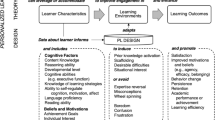Abstract
Nearly 400 junior high school and college students participated in 3 experiments that explored the effects of postquestion treatments on learning from slide/tape presentations. It appears that inserted postquestions can increase the learning of question-relevant information without impairing learning efficiency. The effects of grouped postquestions are unclear, but apparently such questions can impair learning efficiency. The learning of information not directly related to the postquestions was not enhanced by inserted or grouped postquestions and the efficiency of that learning was significantly reduced. No evidence of interac tions with individual differences was found.
Similar content being viewed by others
References
Boker, J. R. Immediate and delayed retention effects of interspersing questions in written instructional passages.Journal of Educational Psychology, 1974,66, 96–98.
Cronbach, L. J., & Snow, R. E.Aptitudes and instructional methods. New York: Irvington Publishers, 1977.
Dayton, D. K. The effects of inserted postquestions upon learning from slide-tape presentations: A test of the mathemagenic hypothesis (Doctoral dissertation, Indiana University, 1976).Dissertation Abstracts. International, 1977,37, 4792A.
Dayton, D. K. Inserted post-questions and learning from slide-tape presentations: Implications of the mathemagenic hypothesis.AV Communication Review, 1977,25, 125–146.
Ekstrom, R. B., French, J. W., Harman, H. H., & Dermen, D.Manual for kit of factorreferenced cognitive tests. Princeton, N.J.: Educational Testing Service, 1976.
Faw, H. W., & Waller, T. G. Mathemagenic behaviours and efficiency in learning from prose materials: Review, critique and recommendations.Review of Educational Research, 1976,46, 691–720.
Frase, L. T., Patrick, E. M., & Schumer, H. Effect of question position and frequency upon learning from text under different types of programmed text.Journal of Educational Psychology, 1970,62, 52–56.
Heestand, D. E.The effects of inserted postquestions and individual differences on learning from two videotape programs. Unpublished doctoral dissertation, Indiana University, 1979.
McGaw, B., & Grotelueschen, A. Direction of the effect of questions in prose material.Journal of Educational Psychology, 1972,63, 580–588.
Rothkopf, E. Z. Learning from written instructive materials: An exploration of the control of inspection behavior by test-like events.American Educational Research Journal, 1966,3, 241–249.
Rothkopf, E. Z. The concept of mathemagenic activities.Review of Educational Research, 1970,40, 325–336.
Rothkopf, E. Z. Experiments on mathemagenic behavior and the technology of written instruction. In E. Z. Rothkopf & P. Johnson (Eds.),Verbal learning research and the technology of written instruction. New York: Teacher’s College Press, 1971, 284–303.
Rothkopf, E. Z. Variable adjunct question schedules, interpersonal interaction and incidental learning from written materials.Journal of Educational Psychology, 1972,63, 87–92.
Rothkopf, E. Z., & Bloom, R. D. Effects of interpersonal interaction on the instructional value of adjunct questions in learning from written material.Journal of Educational Psychology, 1970,61, 417–422.
Schwier, R. A.The effect of individual differences and inserted postquestions upon learning from slide-tape presentations. Unpublished doctoral dissertation, Indiana University, 1979.
Author information
Authors and Affiliations
Rights and permissions
About this article
Cite this article
Dayton, D.K., Schwier, R.A. Effects of postquestions on learning and learning efficiency from fixed-pace, fixed-sequence media. ECTJ 27, 103–113 (1979). https://doi.org/10.1007/BF02765332
Issue Date:
DOI: https://doi.org/10.1007/BF02765332




